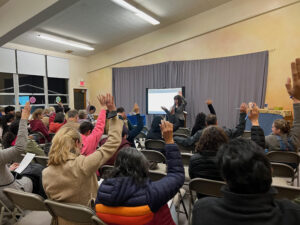by Kevin Krasnow | Director of College Counseling
“It’s not where you go, it’s what you do there.” This is the advice of Dr. Denise Pope, Senior Lecturer at Stanford University and co-founder of Challenge Success, a non-profit affiliated with the Stanford University Graduate School of Education. She spoke to our community earlier this month for a workshop on “A Healthier Approach to College Admissions.” With humorous anecdotes and an engaging PowerPoint presentation, as well as her perspective as a parent who has gone through the admissions process with her own children, Dr. Pope emphasized that fit should be valued over rankings. Keeping a level head during the college search process is key for the well-being, engagement, and sense of belonging of all K-12 students.
 One of my favorite parts of the evening was when Dr. Pope handed out forms with a series of criteria for choosing a college or university to everyone in attendance. The form had 29 categories. For each category, we had to determine whether each was ‘‘not important”, “nice to have,” or “essential”. Here are just a few of them: 1. Diversity of the student body/faculty. 2. Community service opportunities. 3. Mental health services & supports. 4. Small class sizes. 5. Undergraduate academic reputation. It quickly became clear that no two people had the exact same marks or criteria. This brought home the ‘fit’ factor. What might be the right place for one student might not be the right place for another student. Dr. Pope also shared that popular college rankings, such as US News & World Report, used just ten factors to create their rankings, and by a show of hands it was noted that within our group very few present had prioritized any of those particular factors (Morse & Brooks, 2022).
One of my favorite parts of the evening was when Dr. Pope handed out forms with a series of criteria for choosing a college or university to everyone in attendance. The form had 29 categories. For each category, we had to determine whether each was ‘‘not important”, “nice to have,” or “essential”. Here are just a few of them: 1. Diversity of the student body/faculty. 2. Community service opportunities. 3. Mental health services & supports. 4. Small class sizes. 5. Undergraduate academic reputation. It quickly became clear that no two people had the exact same marks or criteria. This brought home the ‘fit’ factor. What might be the right place for one student might not be the right place for another student. Dr. Pope also shared that popular college rankings, such as US News & World Report, used just ten factors to create their rankings, and by a show of hands it was noted that within our group very few present had prioritized any of those particular factors (Morse & Brooks, 2022).
Dr. Pope also told attendees about her experiences when she was touring colleges and universities with her son. After a long car ride, they had arrived at one of the schools that her son had identified as a top match school. But when he saw the small size of the town, and had done a little research, he realized that the town only had three restaurants. Being a foodie, he could not fathom attending a school in an area with such limited cuisine options. He told his Mom, “I will not go to this school.” Taken aback, Dr. Pope reminded her son that there were several reasons this school had made it onto his college list in the first place. But she could tell her son’s mind was made up; the school was not for him. They quickly crossed it off his college list, got back into the car, and drove away because a good fit on paper may not always be one in person.
When I meet with one of our WSP students, my goal is for the two of us to identify schools where they can see themselves being happy; academically, socially, intellectually, mentally, and emotionally. We map out a plan for future success, not just in college, but in life. No stone is left unturned. We look at average classroom sizes, retention rates from freshman to sophomore year, but we also look at schools that have a cappella groups or choirs if a student has a love for singing. For another student on the Walbots, WSP’s robotics club, it could be making sure a college has a similar student group for them. College rankings are never discussed; personal fulfillment and happiness is our chief topic of discussion.
Dr. Pope reminded me that while the college search process is not an easy one, there are so many reasons to be hopeful that a student will make the decision that is right for them. As my high school seniors receive many of their admissions decisions over the next few days and weeks, I am excited for what lies ahead for them. Their best days are still to come!
Morse, R., & Brooks, E. (2022, September 11). How U.S. News calculated the Best Colleges Rankings – US News & World … US News & World Report. Retrieved March 31, 2023, from https://www.usnews.com/education/best-colleges/articles/how-us-news-calculated-the-rankings
